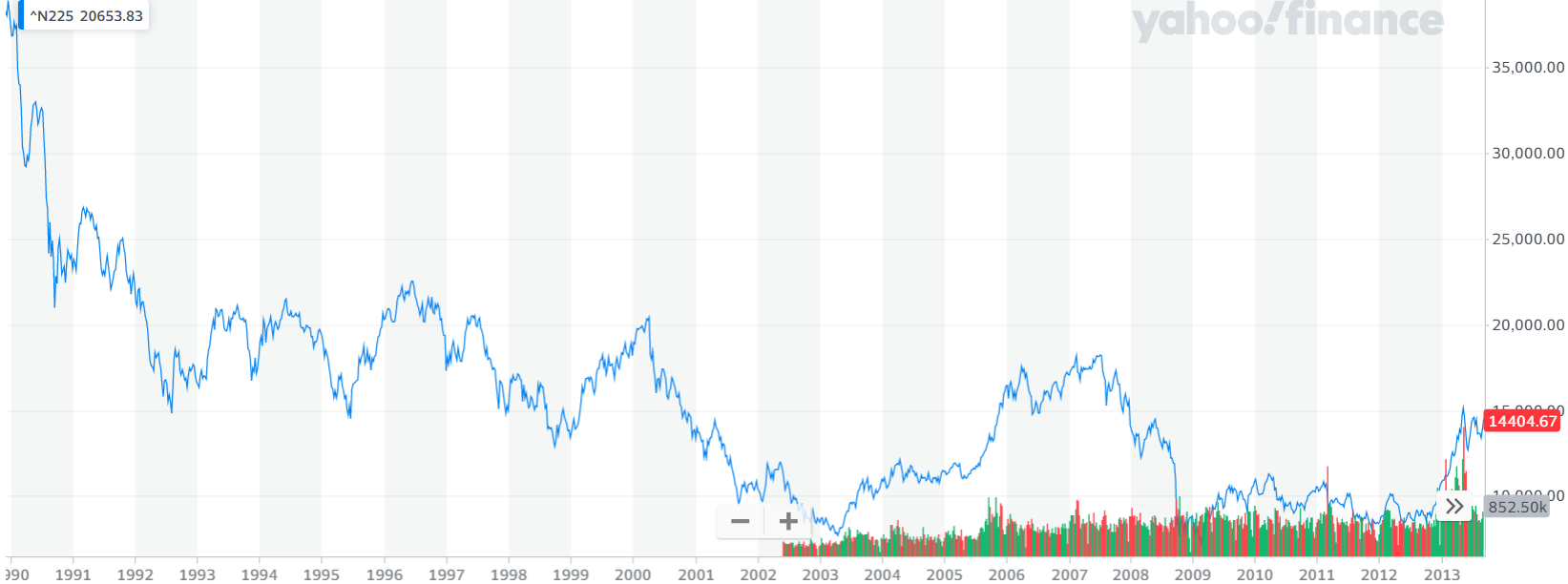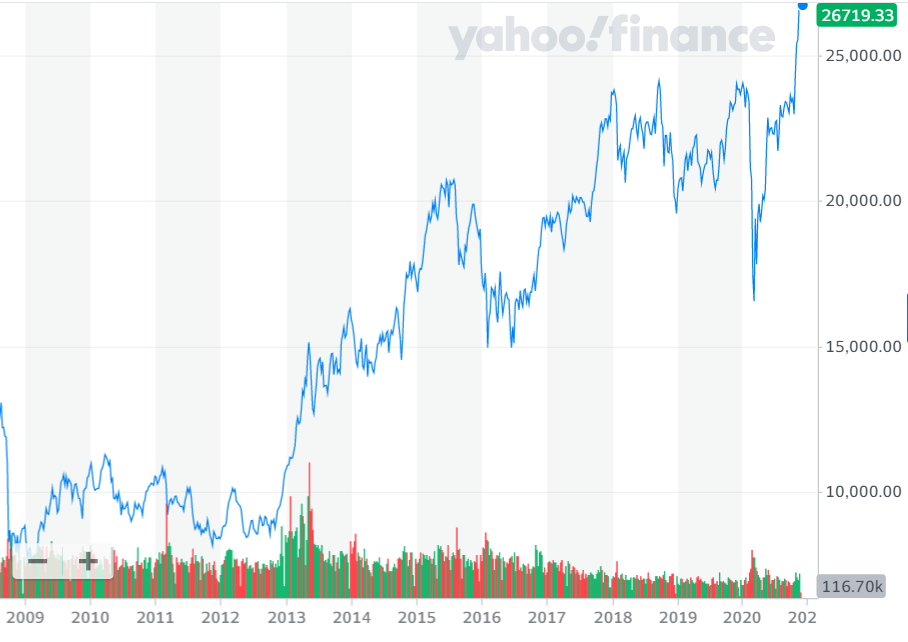Let me show you a pair of stock market charts…
They’re both of Japan’s Nikkei 225 index.
The first tells you a miserable story. Japan’s stocks fell from 38,915 in 1989 to 7,173 in 2009…
That’s an 81% decline over 20 years. Enough to make my Japanese grandmother-in-law’s neighbour commit suicide somewhere along the line. Which is why I don’t ask my father-in-law about finance much…
But let me show you a second chart of the same thing. Only we’ve shifted the timeframe…
Since 2009, the Japanese stockmarket has been booming. Up from 7,173 to 26,719 recently. A 272% gain.
And, more importantly, it’s closing in on levels not seen in 30 years!
Frustratingly, a lot of investors have missed out. Japan’s stocks often get excluded from a lot of funds which promise their investors exposure to Asia. That’s because Japan was seen as a dominant and developed country, as opposed to some of its neighbours.
But back in August of 2019, my colleague Boaz Shoshan and I wrote a piece about Japan and its stockmarket. The introduction goes a long way to explaining why we had to wait so long for Japan’s boom…
Return of the Emperor
In 1968, Suzuki Norio quit university to go hitchhiking around the world. For four years he roughed it across Asia, the Middle East and Africa. Upon his return, he complained Japanese society was too “fake”.
So far, so normal, for many people growing up. Especially at the time. But then things get weird.
In search of his next adventure, Suzuki announced to the Japanese public his intention to find “Lieutenant Onoda, a panda, and the Abominable Snowman, in that order.”
When a Japanese person makes a declaration like this, I don’t recommend making your doubts public. Don’t even smirk. Because one of two things will happen. You’ll be proven wrong or you won’t see the fellow again. Which is usually disappointing given how entertaining things are about to get.
I’m not going to get into the Abominable Snowman here. Although he may have been involved in Suzuki’s untimely death in the Himalayas in 1986. This after an unconfirmed sighting of said Snowman by Suzuki in Dhaulagiri mountain range in 1975. Which confirms my earlier advice about Japanese people not giving up until it kills them.
Suzuki also managed to spot a wild panda before his death, confirming they still roamed at the time. Don’t forget, he had committed himself to a particular order of finding the three fabled creatures.
But many Japanese people considered the first task of finding Lieutenant Hiroo Onoda a bit of a stretch to begin with. Especially after the Japanese government had failed for years, at great effort and expense. Could a wandering hippy really do better than the might and meticulousness of the Japanese government?
But Suzuki did find Onoda. For a simple reason that Japan’s government had overlooked in their own attempts to recover their renegade soldier: incongruous socks.
More on those below…
Pacifism is about to die an expensive death in the Far East
This month’s issue of Zero Hour Alert takes you somewhere very few gaijin (foreigners) have ever been. Into the darkest corners of the Japanese mind. For a simple reason. To make money.
Thanks to President Donald Trump’s rambunctious tweeting, Japan is about to rearm itself. We’re talking about an increase in military spending on a scale not seen outside of wartime. Triggering a vast boom in Japanese defence stocks that you can invest in.
This won’t be the only consequence of Japan returning to the global stage of military superpowers. But it’s the angle worth focusing on for you.
It’s a simple idea. Defence stocks perform well during the economic frenzy of a nation preparing for war. But when you’re dealing with anything Japanese, nothing is simple.
So, before we examine which Japanese stocks you should buy this month, you need to understand what is about to happen in the most interesting nation on earth. And why it’ll happen soon.
To do that, you need to understand how Japanese people think and how they see the world. I believe the extraordinary story of Hiroo Onoda is the key that’ll unlock the Japanese mind for you. Because his story reveals what it means to be Japanese…
The last holdout’s 30-year private war
Hiroo Onoda was the last of the Japanese army’s many holdouts. Soldiers who refused to surrender after World War II. I’ve included a list of the many others. The most recent were discovered in 2005.
But what makes Onoda unique is that he continued the war. For 30 years after being sent into the jungle. And 29 years after Japan surrendered.
Onoda killed so many people and did so much damage to locals’ property during his private campaign that the Japanese government spent extensive resources to try and get him to surrender. But they all failed because Onoda refused to believe that Japan had surrendered. It was inconceivable to him.
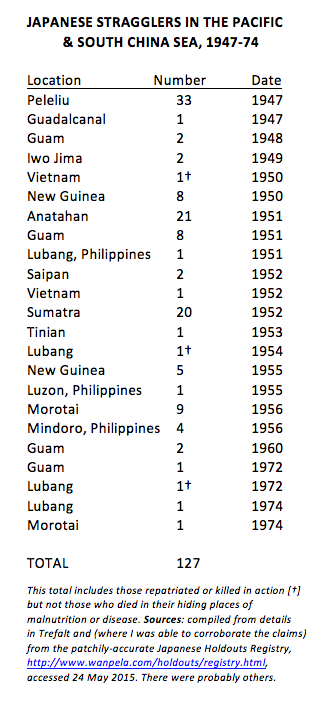 Onoda’s orders, going into the Lubang jungle near Manila Bay on 28 February 1945, were clear: stand and fight. “It may take three years, it may take five, but whatever happens we’ll come back for you,” Major Yoshimi Taniguchi told him. (Don’t forget what I mentioned about Japanese people making grand statements like this.)
Onoda’s orders, going into the Lubang jungle near Manila Bay on 28 February 1945, were clear: stand and fight. “It may take three years, it may take five, but whatever happens we’ll come back for you,” Major Yoshimi Taniguchi told him. (Don’t forget what I mentioned about Japanese people making grand statements like this.)
And so Onoda kept busy, with 29 years of terrorising the locals, raiding, burning and stealing their property, and killing about 30 of them, all after the war had ended. He gradually became a bit of a myth, comparable to wild pandas and the Abominable Snowman.
Just the sort of adventure Suzuki Norio was looking for in 1974, in other words. And Suzuki’s strategy to find Onoda was simple: yell his name while walking around the Philippine jungle.
And it worked, in just four days. Putting the Japanese government’s years of meticulous efforts to shame. But Suzuki only succeeded for a very particular reason.
Incongruous socks
Here’s how Onoda described meeting Suzuki in the jungle:
If he had not been wearing socks, I might have shot him. But he had on these thick woollen socks, even though he was wearing sandals. The islanders would never do anything so incongruous.
Keep that in mind the next time you’re on holiday and get funny looks for your footwear. It
likely saved a man’s life in the Philippine jungle.
Human curiosity got the better of Onoda in much the same way that my wife and I began dating. They became friends and we got married. My behaviour continues to mystify my wife, so things are going well.
After spending 30 years in the jungle of Lubang, you might think Onoda was looking for a way out. But you’d be wrong about the Japanese mind. Onoda recalled what happened when Suzuki spotted him:
He stood up and turned around. His eyes were round… he faced me and saluted. Then he saluted again. His hands were trembling, and I would have sworn his knees were too.
He asked, “Are you Onoda-san?”
“Yes, I’m Onoda.”
“Really, Lieutenant Onoda?”
I nodded, and he went on.
“I know you’ve had a long, hard time. The war’s over. Won’t you come back to Japan with me?”
His use of polite Japanese expressions convinced me that he must have been brought up in Japan, but he was rushing things too much. Did he think he could just make the simple statement that the war was over and I would go running back to Japan with him? After all those years, it made me angry.
“No, I won’t go back! For me, the war hasn’t ended!”
And so Onoda refused to surrender. After 30 years in the jungle, he refused to believe Japan had lost. He later explained more about why to Australia’s news agency, the ABC:
Every Japanese soldier was prepared for death, but as an intelligence officer I was ordered to conduct guerrilla warfare and not to die. I had to follow my orders as I was a soldier.
This hippie boy Suzuki came to the island to listen to the feelings of a Japanese soldier. Suzuki asked me why I would not come out.
I said that if the war was over and I received an order telling me to stop fighting I would come out.
Although Japanese people will do anything to maintain “face”, or honour, this also means they have to come up with creative solutions to solve standoffs. Listen carefully to Japanese ultimatums and you’ll discover there is always a hint for a way out. The trick is to find it.
In typical Japanese fashion, Onoda’s standoff was resolved in the most harmonious and compromising way possible, regardless of expense and inconvenience. Suzuki found retired Major Yoshimi Tanaiguchi working at a bookstore in Japan and flew him to Lubang to rescind his order of 30 years earlier.
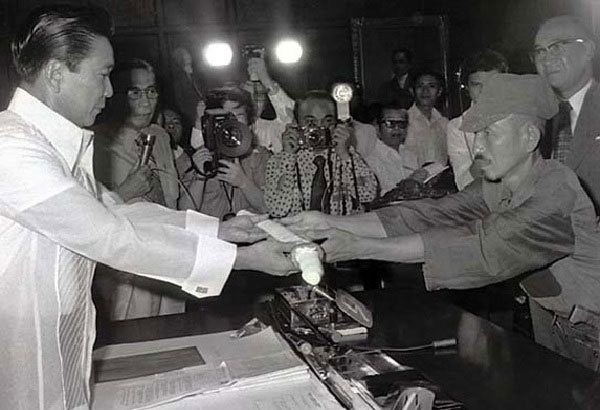
And so, on 9 March 1974, a weeping Onoda was relieved of his duty by his long since retired superior officer of 30 years before. He handed over a samurai sword, plenty of ammunition, a well maintained working rifle and hand grenades. His uniform had seen better days, but he still wore it.
Philippine President Ferdinand Marcos accepted Onoda’s sword in surrender and pardoned Onoda for his private war. Marcos’ forgiving nature may have been encouraged by a frightening amount of Japanese war gold claimed by the Marcos family.
Understanding the Japanese mind
Before you judge Onoda’s story as some sort of aberration, consider the following. He was far from the only one. And secondly, he was strangely ordinary.
While hanging out in the jungle, he listened to Australia’s ABC Radio Japanese language service. I listen to ABC radio for less biased cricket commentary.
Onoda didn’t spend 30 years alone in the jungle. He initially had his team of soldiers with him. One surrendered in 1950. Another was killed in 1954. And a third was shot by police in 1972 while destroying rice stores at a farm.
The fighters ignored the Japanese government’s attempts to get them to surrender. Aerial flyer dropping campaigns with letters from their families and even the emperor himself failed. Onoda later told the ABC that, “The leaflets they dropped were filled with mistakes so I judged it was a plot by the Americans.”
When Onoda returned to Japan, he was welcomed as a hero, or with a great deal of awkwardness, depending on who you believe. He didn’t like the new Japan much though and emigrated to Brazil to set up a cattle farm. This had been his dream since he learned about cattle farming from ABC Radio while out in the jungle.
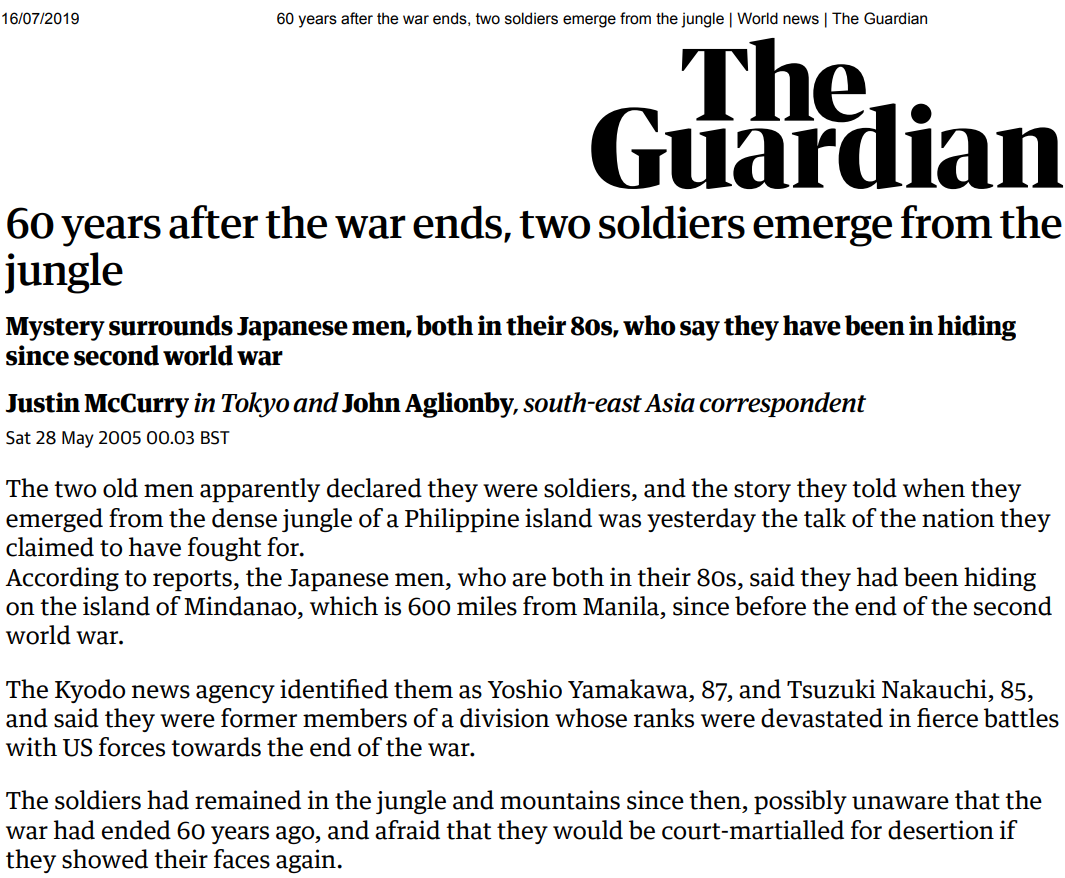
If you’ve eaten Wagyu beef, you’ll have some idea of how it came about. The sort of devotion a man like Onoda has for a task, applied to consumer goods. This obsession for perfecting daily items is why I want to live in Japan. The sort of obsession it takes to be a Japanese person is why my wife doesn’t want to live there.
Then there’s Suzuki’s obsession to find Onoda. And wild pandas and the Abominable Snowman. Which killed him, because he didn’t get sufficient proof the first time. It’s a similar story to Onoda’s.
My point here is the nature of obsession. Or devotion, depending on what you’re implying. Japanese people are more devoted and obsessed with things than anyone else. As the saying goes, “the Japanese are just like everyone else, only more so”.
There are plenty of examples of this. Japanese people have one career. Their profession defines them. They are utterly loyal to their employer, for life. And they view the greater good to be vastly more important than their own welfare. In short, they are perfectly capable of being content while they’re miserable. As long as it’s for a cause.
Now let me ask you, does all this sound like the mentality of a nation that is content with an indefinite state of surrender? Or does it sound like the mentality of a nation prepared to wait for the right moment?
What does Onoda’s story reveal?
There are a few things about the Japanese mind you need to understand, if you want to get an idea of what’s about to happen in Japan. I hope Onoda’s story brings them alive for you. But what exactly are they?
I can’t reveal where we took subscribers from there. But I think our story highlights that Japanese people are rather patient. And it puts into perspective the 30-year wait for the current level in the Nikkei 225 index.
But now, the Japanese stockmarket comeback may well be beginning.The Japanese stock market isn’t the only one that could be set to outperform. In fact, Nigel Farage and Rob Marstrand have put together a presentation about what they’re expecting for the stock market in 2021. Have you watched it?
Best wishes,

Nick Hubble
Editor, Fortune & Freedom

